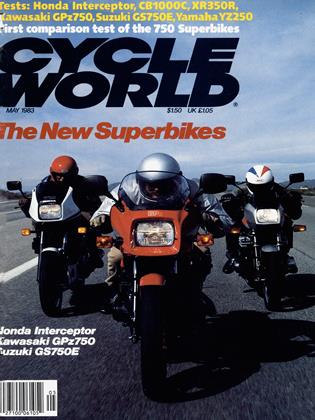HARLEY NEARER TO TRADE RELIEF
Agreeing that Harley-Davidson is endangered by low-cost imports, the U.S. International Trade Commission has recommended sharply increased tariffs on large-displacement Japanese motorcycles.
The commission decided that the current 4.4 percent tariff tacked onto the wholesale value of imported Japanese bikes should be raised for five years.
The recommendation was forwarded to President Reagan, who has until late March to accept or reject it. So, by the time you read this, the new tariffs already may be in effect.
The commission urged that import duties be raised to 45 percent the first year. It suggested a decreasing schedule over the next four years: 35 percent, 20 percent, 15 percent and 10 percent.
The tariffs would apply to motorcycles with displacements larger than 700cc, and to large-displacement engine and transmission components imported for assembly in the U.S.
Vaughn Beals,chairman and chief executive officer of the Harley-Davidson Motor Co., described the suggested tariffs as “reasonable.”
He estimated the increased duties would add about 20 percent to the cost of new imported motorcycles from Japan. The new tariffs would not apply to current American inventories.
The commission’s decision followed a finding that imports of large-displacement motorcycles had flooded the American market and seriously hurt Harley.
Harley had asked for temporary relief from the imports, arguing its sales, profits and future had been “severely injured” by imports of motorcycles manufactured by Japan's Big Four Honda, Yamaha, Suzuki and Kawasaki and sold in the U.S at what Harley maintained were artificially deflated prices.
ITC Chairman Alfred Eckes said a commission study found that there was a one-year inventory of imported largedisplacement motorcycles in the U.S. That build-up, Eckes said, “depresses the domestic market and endangers the U.S. industry.”
Harley had argued that the Japanese companies were preparing to drastically discount retail prices in an attempt to cut their excessive inventories. Such strategy, Harley said, constituted “dumping,” which is forbidden by U.S. trade laws.
“We started out to draw attention to the competition’s attack and the supply of unsold motorcycles the Japanese built up in this country. We have done that and we now have the weight of an important government agency behind us,” Beals said.
Imposition of the increased duties, Beals said, would give Harley time to complete a renovation and modernization of its manufacturing facilities.
In the past year, Harley laid off 1600 of its 3800 employees.
“The ITC sees the need to do something about preventing further injury to the U.S. motorcycle industry and providing us with the breathing room we need to complete our competitiveness program,” Beals said.










